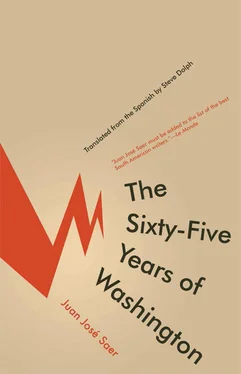Juan José Saer - The Sixty-Five Years of Washington
Здесь есть возможность читать онлайн «Juan José Saer - The Sixty-Five Years of Washington» весь текст электронной книги совершенно бесплатно (целиком полную версию без сокращений). В некоторых случаях можно слушать аудио, скачать через торрент в формате fb2 и присутствует краткое содержание. Год выпуска: 2010, Издательство: Open Letter, Жанр: Современная проза, на английском языке. Описание произведения, (предисловие) а так же отзывы посетителей доступны на портале библиотеки ЛибКат.
- Название:The Sixty-Five Years of Washington
- Автор:
- Издательство:Open Letter
- Жанр:
- Год:2010
- ISBN:нет данных
- Рейтинг книги:3 / 5. Голосов: 1
-
Избранное:Добавить в избранное
- Отзывы:
-
Ваша оценка:
- 60
- 1
- 2
- 3
- 4
- 5
The Sixty-Five Years of Washington: краткое содержание, описание и аннотация
Предлагаем к чтению аннотацию, описание, краткое содержание или предисловие (зависит от того, что написал сам автор книги «The Sixty-Five Years of Washington»). Если вы не нашли необходимую информацию о книге — напишите в комментариях, мы постараемся отыскать её.
The Sixty-Five Years of Washington — читать онлайн бесплатно полную книгу (весь текст) целиком
Ниже представлен текст книги, разбитый по страницам. Система сохранения места последней прочитанной страницы, позволяет с удобством читать онлайн бесплатно книгу «The Sixty-Five Years of Washington», без необходимости каждый раз заново искать на чём Вы остановились. Поставьте закладку, и сможете в любой момент перейти на страницу, на которой закончили чтение.
Интервал:
Закладка:
— The idea to celebrate his sixty-fifth birthday was the twins’, says the Mathematician. And you have to tip your hat to them for bringing together such a diverse crowd. But as the saying goes: not everyone there was someone nor was everyone who’s someone there.
Leto looks at him: Is this a courtesy? But his look bounces off the perfect profile of the Mathematician who, with his gaze fixed on a point of air between the sidewalk and the treetops, somewhat absently, remembers: one night the previous summer when they were talking to Washington, Tomatis, and Silvia Cohen on the Cohen’s terrace, and Tomatis, who had been filling his glass of gin on the rocks nonstop, had begun to curse the fate of humanity, purely in jest, raising a threatening fist to the starlit sky, and he, the Mathematician, had started pulling his leg, but Washington, without distracting himself very much from his conversation with Silvia Cohen, had told Tomatis, pretending to answer an honest theoretical question, to let it go, that from a logical point of view the person who purely and simply whimpers under the stars, frightened by the absurdity of the situation, is closer to the truth than someone who, trying to be a hero or a believer in historicity, attempts, in spite of everything, to raise a family or win a book award from the SADE. A quick, distracted and discreet smile flashes in the Mathematician’s eyes. But, for some obscure reason, which even he is not conscious of, instead of telling that anecdote about Washington, he tells another, which he hasn’t thought about in a long time and which, as he started telling it aloud, was free of its representations.
— I heard that once a fantasy story writer, who was visiting him from Buenos Aires, asked Washington if he ever thought of writing a novel. And Washington puts on a scared face, as if the writer were threatening him. After a moment he answers: I, like Heraclitus of Ephesus and general Mitre in Paraguay, shall leave but fragments.
They laugh, continue on. The Mathematician thinks: Noca said that, if he came late, it was because one of his horses had stumbled . And Leto: He stole the love of his life, turned him into a bachelor, left him in charge of his family, and he says that he owes him everything .
— Supposedly, says the Mathematician, Noca told Basso that he’d be late because one of his horses had stumbled and broken a leg. They stood, Botón had said, five or six around Cohen, chewing cubes of mortadella and drinking beer as an appetizer, and observing Cohen, who was arranging coals and firewood, not without making every kind of grimace and weeping from the heat and smoke from which the spectators remained at a comfortable distance. And when, according to Botón, Basso had related Noca’s excuse, Cohen had abruptly interrupted his work and, without stopping from weeping and making painful grimaces, had planted himself, insistently, in front of Basso: Since when do horses stumble? he’d said.
— What? They don’t stumble? Leto says.
— They stumble, they do, says the Mathematician placatingly. And after a doubtful pause: Actually, it depends.
— Depends on what? Leto says.
— Depends on what you mean by stumble .
According to the Mathematician, and always according to Botón, no? Cohen’s argument had been the following: if stumbling is an er ror, and horses, like every other animal, act purely on instinct, isn’t it contradictory to attribute an error to instinct? An instinct would be something that, by definition, does not make mistakes. Instinct, Cohen said before returning triumphant to the flames, is pure necessity. When he turned his back on the spectators to work the fire with exaggerated attention, you could sense, to his satisfaction, a general silence. But a moment later Basso interjected again: He was only relating what Noca had told him, to let everyone know that, if he was late, it was because one of his horses had stumbled and. . Yeah, yeah, we get it , interrupted, with lighthearted impatience, Barco, who had left his post at the keg and reached the pavilion just in time to hear Basso’s story and Cohen’s objection. What, in his opinion, you had to ask yourself instead, were two things: the first, if it’s true that instinct doesn’t make mistakes; the second, if stumbling is a mistake. A pensive silence fell over the gathering. Basso interjected again: The problem with Noca was you could never tell when he was mythologizing and when he was telling the truth. And because he didn’t provide many details, they were forced to guess whether the horse had stumbled alone or when someone was riding it: Leto evokes, easily, the image of a man on a horse. The Mathematician thinks: The problem only arises for a horse with a rider. In that case, the error is the rider’s and not the horse’s . Just then, though, and always according to Botón, there was a commotion: Tomatis was carrying the fish, which he had just rewashed at the kitchen sink, in an enormous plastic tub ( yellow , Leto thinks). You have to wash them again because there’s always some sand left behind , the Mathematician says that Botón told him that Tomatis said. And he adds : For Tomatis to have washed the greens and rewashed the fish shows how much he admires Washington. He and El Gato are his favorites. Washington, though he isn’t one or the other, has a soft spot for cynics and the arrogant .
But Tomatis isn’t cynical and El Gato isn’t arrogant , Leto thinks. Or is it the opposite? At that point, according to the Mathematician, it’s easy to imagine what followed: The fat catfish who offer the fruit of their body year round and the metallic perch who, prudently, only appear in winter, were submitted to the proper treatment for highlighting, perfecting even, their qualities; after filling them with a generous portion of onion and some parsley and bay leaf, they dipped the newspapers in oil and, with a dusting of salt and pepper, wrapped the fish up and arranged them neatly in rows on the grill, where the carefully distributed coals beneath would prevent any of the fragile meat from being lost. And to think he calls Botón a folklorist , Leto thinks with a touch of bad faith now that he can detect, in the Mathematician’s description, a touch of irony. Because, additionally, the Mathematician insists that whosoever looks to swim unaided in the colorless river of postulates, syllogistic modes, categories, and definitions should accompany his studies with a strict dietary regimen: fed on yogurts and blanched vegetables, the abstract order of everything, in its utmost simplicity, will be revealed, ecstatic and radiant, to the relentless, recently bathed ascetic.
— I’ll be right back, the Mathematician says unexpectedly, and taking from his pants pocket several pages folded in quarters, he enters the La Mañana building. Leto sees the tall, tanned body, dressed in all white, cross, with elegant strides, the threshold of the morning paper. After tomorrow, the press release, soaked in oil, will be used to wrap up perch and catfish , he thinks bitterly. And then: He left suddenly to force me to stay . Accepting, passively, the inexplicable need for his company that the Mathematician seems to feel, Leto leans against the trunk of the last tree on the sidewalk. Beyond the bright cross street, at the opposite corner, the street widens abruptly, and trees no longer line the sidewalks. As they have approached the city center, more people have appeared on the streets, and because the commercial district proper starts to concentrate after the next block, the passing cars, slow and humming, are mixed with bicycles, tricycles, and light delivery trucks painted with the names and addresses of businesses. Despite the conversation and the Mathematician’s story, Leto is submerged in his own memory, where Lopecito’s voice, with his Rosario accent, murmurs, melancholic and stunned. We built radios in a little workshop on Calle Rueda. And when people started talking about television, during the second World War, your old man started studying English and ordered technical magazines from North America. You were two or three. Don’t you remember how, on his own dime, he started putting together a television in the garage you had in Arroyito? You should remember because you were older then. You remember? He remembers: he slept in the room next door. Every night, Isabel, in a nightgown, would get up three or four times and bang on the locked door to the garage. Can’t you answer? Can’t you answer? she would yell. He listened to the same insistent lament every night. Later, when the house was dark and silent, he would hear the garage door open and close, and breathing and footsteps moving, in the darkness, toward the bedroom. Isabel’s whiny, sleepy voice could be heard again, and Leto, holding his breath to hear better, waited for the response that never came: What can you do, it was a sexual thing , he thinks, his eyes fixed on the bright intersection. Or something even worse . Lopecito, meanwhile, his eyes full of tears, muting his intensity with that whispered register that’s reserved for wakes: Don’t you remember before the television came to Rosario we did a demonstration at the Sociedad Rural with a machine he’d built in the garage and there were write ups in La Capital? He’d order parts from Buenos Aires, from the U.S., and what he couldn’t find he made himself . Isabel would come in from time to time and hug them, crying. You’ll have to be very good to your mother now , Lopecito said, and, so that Isabel wouldn’t hear, he added in Leto’s ear: While I’m alive and can use my hands you won’t want for anything, I give you my word . And he was making good. But he, Leto, no? felt like he was on stage, and not that he didn’t have anything to say, or that Isabel and Lopecito and everyone else hadn’t learned their roles, but they were all acting, on the same stage but in different plays. Once in a while, something they said was so surprising that Leto could only stare, waiting for them to bust out laughing, because he thought they were joking. But the laughter never came. The familiar faces became impenetrable, remote masks, and no matter how much he examined them he got nothing, nothing whatsoever, no? from anyone. They were like another species, like those invaders in science fiction movies who come from another planet and take on a human form to better facilitate their takeover. His father, for example, whom they had put in a casket, was he really dead, or pretending? And what Isabel and Lopecito said about his person — his father’s, I mean, no? — coincided so little with Leto’s empirical reality that he heard them as formulaic expressions memorized to further some conspiracy. For that good man, for that inventor who had ended up dedicating himself to the sale of electrical goods, Leto felt neither love nor hate, but rather a neutral anticipation, similar to what we feel when, after smashing a housefly with a shoe, we wonder whether it still has the reflexes to keep twitching a little more over its ruined self. There was something in the man’s habits that no one seemed to perceive but which to Leto was the essential and all but singular characteristic that emanated from his person — a kind of sardonic expression that signified something like: just wait and see, just wait for when I decide to , or when that , rather, that which he was on the verge of, and which others seemed to ignore, would be decided. That inner half-smile that, on the contrary, never once escaped Leto, announced to the world an approaching catastrophe whose unmistakable signs its bearer had seen from the beginning. It couldn’t have been only sexual , Leto thinks, feeling the tree trunk, hard and rough, on his back, through the thin fabric of his shirt. Even though César Rey argues that, looked at a certain way, even Billiken is a pornographic magazine. No, it was something separate and distinct from the sexual , he thinks, a constituent part of himself that stained everything and that poisoned him . All the afternoons, the mornings, the evenings that made up his life had been corroded by that toxic substance he secreted, and which, whatever he did, whether he was still or tried to stifle it, never stopped pouring out and leaving a pestilent smear on everything. And , Lopecito was saying, your old man was. . he was a genius with. . I owe him. . etc. Leto remembers that in the garage where his father shut himself up there was a kind of large table, made of pine, bolted to the wall, and a giant heap of casings to radios, full, empty, or with the insides half out and spilling from the back, bulbs, tubes, pins, knobs, loose plugs, colored cables, copper wire, technical books and magazines, pliers, screwdrivers, and even when he didn’t take part in the permanent squabble that pitted Isabel against his father, that his father, although somewhat distant, was more or less friendly or indifferent, and that all of those mysterious and colorful things intertwined on the table in the garage never lost their appeal, though he never touched them, not out of fear of his father, who would have no doubt been pleased by his son’s interest, but fear of that fluid that, possibly without realizing, his father secreted, and whose signs Leto could detect on everything, the way the earth shows, through indistinct but definitive markers, the clear trail of a snake or scorpion. Leto imagined him bent over the table, under lamp light, working a tiny screwdriver and, for some unknown reason, not responding when Isabel banged on the door each night. Open the door. I said open it , Isabel would say, her tone desperate, until, surrendering, she’d finally go to bed, not without whimpering a while before falling asleep, and, still, the next morning she would wake up radiant, and sing while she made breakfast, straightened up the house, or walked to the market. That sudden change intrigued Leto: Was it faked, or was it the nightly desperation and the whimpering in bed that she faked, or was it all faked, or none of it? And this morning when, turning from the glowing blue rings on the stove, she said that unexpected, He suffered so much , Leto thinks, And I started pointlessly scrutinizing her face, its impenetrability came, precisely, from the absence of artifice. She‘s not faking when she sings or when she talks or when she shuts up or even when she insists that she’s doing one thing when in fact she’s doing the opposite. She lives a plain life, in a single dimension —the dimension of her desire, the desire for nothing, or rather for the contradiction to not exist. And Lopecito, no? the night of the wake, as soon as they were alone: Everything came out right for him. When he started in sales he had so much work he called me to offer the whole north part of the province if I wanted it. Nothing would have stopped us from expanding, but he preferred freedom and, more than anything else, shutting himself up in the garage every night to work. He was in love with technology. He was so enthusiastic . Leto listened, silently, telling himself over and over that even poor Lopecito had been sucked into that masquerade, and with a conviction that exceeded every expectation. That plain universe which, for mysterious reasons, and without their suspecting it, Leto had been excluded from, in a way that made the generalized vacuousness of their actions immediately recognizable, seemed impregnable less because of its solidity than because of its inconsistency — diffuse, irregular, and ubiquitous.
Читать дальшеИнтервал:
Закладка:
Похожие книги на «The Sixty-Five Years of Washington»
Представляем Вашему вниманию похожие книги на «The Sixty-Five Years of Washington» списком для выбора. Мы отобрали схожую по названию и смыслу литературу в надежде предоставить читателям больше вариантов отыскать новые, интересные, ещё непрочитанные произведения.
Обсуждение, отзывы о книге «The Sixty-Five Years of Washington» и просто собственные мнения читателей. Оставьте ваши комментарии, напишите, что Вы думаете о произведении, его смысле или главных героях. Укажите что конкретно понравилось, а что нет, и почему Вы так считаете.












